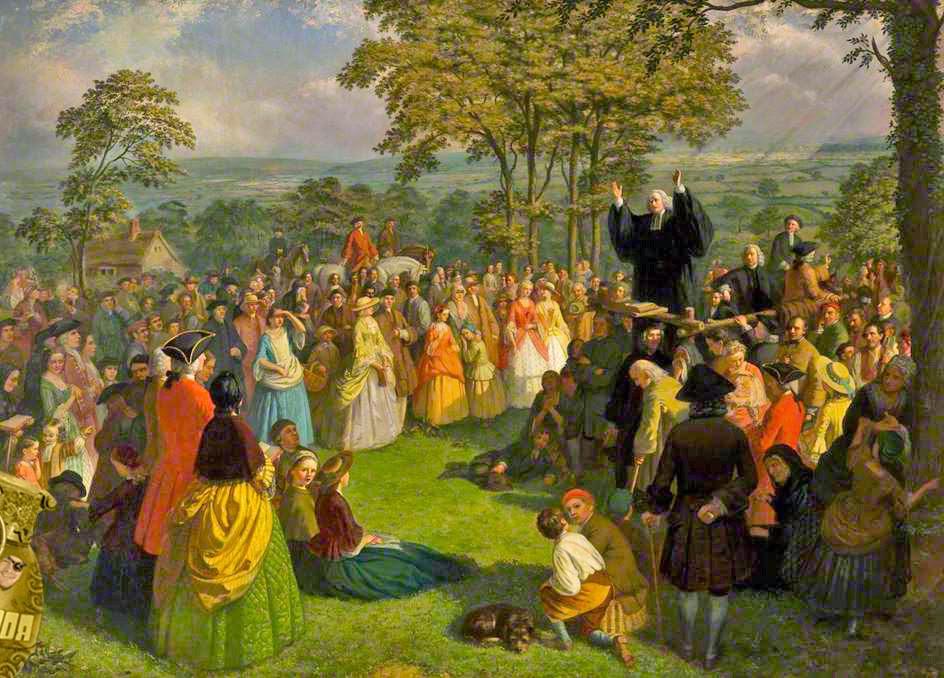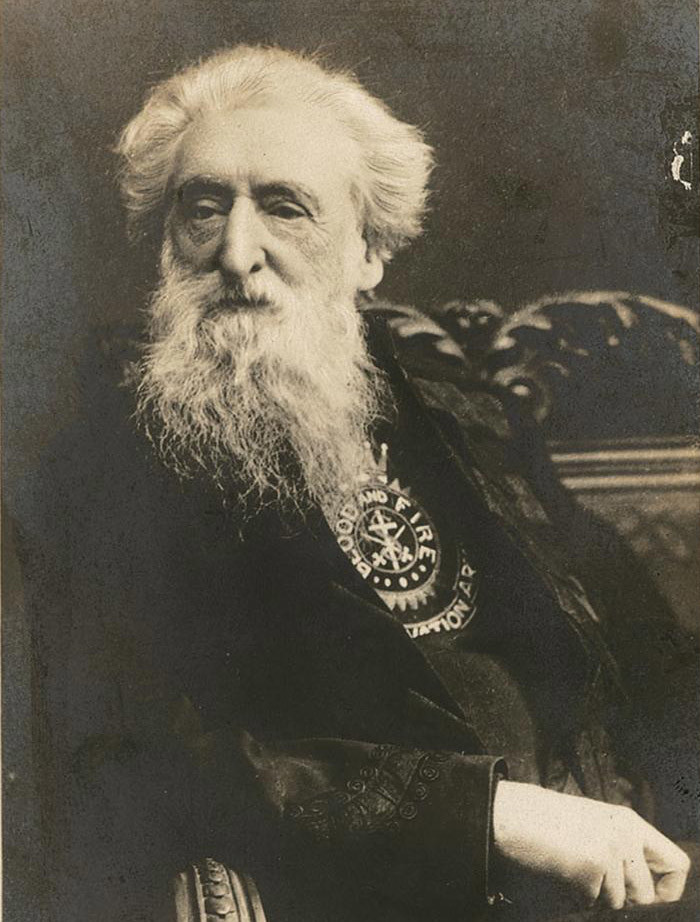(A Brief Synopsis)

Written by: Elizabeth
Oath of God Ministries
When pondering the qualities of great men who have been used mightily by God, I’ve often thought of the commonalities found in preachers such as Jonathan Edwards, George Whitefield and William Booth. Putting aside their doctrinal differences, it was their passion for Christ, their zeal to evangelize, and their perseverance to overcome persecution that has drawn my deep appreciation over the years for each man. Although volumes of books have been written by various theologians on their respective sermons, it is the core commonalities among these three great preachers that I wish to highlight.
Their Sense of Urgency for Christ
With each man there was a profound sense of urgency bound by an indefatigable passion to introduce Christ Jesus to a dying world. Even amidst the daily demands that might otherwise distract an average man – these three preachers were known to seize the slightest opportunity to evangelize a sinner while running the distance to preach Christ Crucified to a dying world. As Apostle Paul urges each of us to heed our calling in Christ by “redeeming the time, because the days are evil” – these three preachers made it an imperative duty like breathing is to life.
This urgency was real to Booth who declared, “Can we go too fast in saving souls? If anyone still wants a reply, let him ask the lost souls in Hell.” (1) Even today we can still sense the zeal of William Booth as he repeatedly urged his members, “Go for souls. Go straight for souls, and go for the worst.” (2) Undergirded by Apostle Paul’s declaration, “Behold, now is the accepted time; behold, now is the day of salvation” his members saw many souls redeemed in Christ Jesus.
We sense this same urgency in Whitefield the day before his death when he was asked to preach in Exeter, N.H. Urged by a friend to decline the event due to poor health, Whitefield replied, “True, sir’; and then turning aside, he clasped his hands together, and looking up, said: ‘Lord Jesus, I am weary in thy work, but not of thy work. If I have not yet finished my course, let me go and speak for thee once more in the fields, seal they truth and come home and die’.(3) Whitefield preached for 2 hours in Exeter but sadly died the next day on Sunday, September 30, 1770. It is estimated that throughout his life, he preached more than 18,000 formal sermons, of which seventy-eight have been published.(4) 
On the other hand, Edwards, the theologian, was better known for his rigorous study of the Word upon which he often spent up to 13 hours a day. He received, however, a robust return on his investment by way of his sermons where multitudes were snatched from the fire and where the sensibilities of sinful men were individually exchanged for the righteousness of Christ at Calvary’s Cross. He clearly knew the world was filled with humans standing precariously on a slippery slope with unsure footing and indiscriminately unaware of their pitiful condition. Indeed, there was a sense of urgency embedded in his sermons which made men keenly aware of their debased nature outside of Christ and their desperate need for salvation in Christ.
Their Conviction of Sin
The greatest commonality among these great preachers was their gifted ability in Christ to convict sinful men of their sin. Unabashedly they pointed to man’s sin, God’s wrath upon all unregenerate souls and the eternal consequences due each sinner rejecting Christ Jesus as well as the permanent abode in hell awaiting each offender. Their compelling sermons summed up their avowal to continually embrace the scripture, “For I am not ashamed of the gospel of Christ, for it is the power of God to salvation for everyone who believes, for the Jew first and also the Greek.”
Clearly they were not ashamed to preach Christ Crucified or to shake the undeniable contentment of sleeping men bound for hell. In all their sermons God found sufficient evidence to honor their passionate words whereby the Holy Spirit moved powerfully in grace among the people by reaping a bountiful harvest of souls for Christ.
When Edwards preached “Sinners in the Hands of an Angry God” at Enfield, CT on July 8, 1741 the manifestations of the Holy Spirit visibly stirred the souls of men where one witness noted, “Before the sermon was done, there was a great moaning and crying out throughout the whole house. What shall I do to be saved? Oh, I am going to hell! Oh what shall I do for Christ?”(5) Hell was never to be avoided in his sermons so that hell itself, from an eternal standpoint, might be avoided altogether for the blissful exchange of heaven. In fact, Edwards so passionately loved the reality of heaven he was compelled to pound the pulpit on hell to prevent mankind from going there. In the same sermon Edwards descriptively declared, “Unconverted men walk over the pit of hell on a rotten covering” which remains a powerful truth today but stands in contrast to the vapid messages heard in pulpits across America where hell is altogether absent from the sermon and in some corners – no longer believed.
Even George Whitefield admonished pastors never to mince words when it came to preaching the Word. “It is a poor sermon that gives no offense; that neither makes the hearer displeased with himself nor with the preacher”.(6) Even a new convert after hearing Whitefield’s sermon commented, “I came to hear you, with my pocket full of stones, intending to break your head; but your sermon got the better of me—and broke my heart!”(7) How beautifully summarized by this newborn Christian but little did he know it was God’s amazing grace which overtook his stony heart and carried him lovingly to the Cross to where his pocket full of stones were emptied out before the feet of Jesus thereby sparing Whitefield the injury. So I must ask this question to the reader, “Should not each of us be discontented with our own souls when we refuse to disrupt the contentment of men who unknowingly are headed to hell?”
Endurance Through Persecution
There was the commonality of persecution. They all paid a price. Most church doors were closed to George Whitefield. In turn, he preached in the open fields and public squares. By the thousands – people came to hear him. By the thousands – they received Christ Jesus as their personal Savior.
Indeed, there were many hostile  incidents including mob riots against Whitefield but two specifically stand out. In 1744, Whitefield was almost murdered by a man feigning an interview with him. Uttering foul language, calling him a dog, villain and other such things, subsequently beat him with a gold-headed cane almost to the point of unconsciousness.(8) In 1757 while preaching in Ireland rioters threw stones at him while his attendants fled the scene leaving him covered in blood. History tells us that he walked half a mile alone while rioters continued to hurl stones at him until he found a safe abode along the way. On numerous occasions Whitefield would repeat to his audiences, “I was honored with having stones, dirt, rotten eggs and pieces of dead cats thrown at me.”(9) Indeed, Whitefield rejoiced in tribulations and persecutions. He loved the world which hated him.
incidents including mob riots against Whitefield but two specifically stand out. In 1744, Whitefield was almost murdered by a man feigning an interview with him. Uttering foul language, calling him a dog, villain and other such things, subsequently beat him with a gold-headed cane almost to the point of unconsciousness.(8) In 1757 while preaching in Ireland rioters threw stones at him while his attendants fled the scene leaving him covered in blood. History tells us that he walked half a mile alone while rioters continued to hurl stones at him until he found a safe abode along the way. On numerous occasions Whitefield would repeat to his audiences, “I was honored with having stones, dirt, rotten eggs and pieces of dead cats thrown at me.”(9) Indeed, Whitefield rejoiced in tribulations and persecutions. He loved the world which hated him.
Booth had his share of enemies as well. Again, there were too many incidents of beatings, stone throwing, and member killings to mention herein. The Skeleton Army, a fierce opposition to the Salvation Army, was forged by miscreants, ruffians, saloon owners and traders of alcohol all of whom wanted to both discredit and destroy Booth’s marching brigade for Christ. In the end, many saloons closed in England, Booth became an international figure of admiration and many of his earlier adversaries received their salvation in Christ Jesus. Through it all there was victory but not without a price.
Jonathan Edwards would not know persecution quite like Whitefield or Booth but disappointments would follow his life following the Awakening’s peak. Edwards took to his pen to defend the Awakening against theologians disputing the genuine works of God. It was, however, his own congregation that gave him the greatest difficulty. He was ousted by his congregation when he broke with church tradition requiring new member applicants to give a profession of faith before partaking of communion. A reasonable request but sufficient to terminate his services. There were other myriad and mounting reasons but this seemed to be the “straw that broke the camel’s back.” With eight children still at home he eventually took a position in Stockbridge where he ministered to a small population of colonists and became a missionary to its native Indians. He later received the position of President to the College of New Jersey (Princeton University) in 1758 but died shortly thereafter of complications from smallpox.
We can only sigh to think of such a great man taken too early with many great writings still unfinished. We can only ponder what greater works might have been accomplished at the College by Edwards or perhaps what greater trials may have awaited him there as well.
Need to Repent
 Booth remained concerned about the church’s future condition and spoke a foreboding message to Christians by saying, “I consider that the chief dangers which confront the coming century will be religion without the Holy Ghost, Christianity without Christ, forgiveness without repentance, salvation without regeneration, politics without God, and heaven without hell.” (10) How William Booth’s warning resonates in our hearts today knowing full well that his prophetic message has already come to fruition bearing its plump fruits of unrighteousness which were tilled and seeded by the hands of complacency over these many decades in lukewarm church climates across America.
Booth remained concerned about the church’s future condition and spoke a foreboding message to Christians by saying, “I consider that the chief dangers which confront the coming century will be religion without the Holy Ghost, Christianity without Christ, forgiveness without repentance, salvation without regeneration, politics without God, and heaven without hell.” (10) How William Booth’s warning resonates in our hearts today knowing full well that his prophetic message has already come to fruition bearing its plump fruits of unrighteousness which were tilled and seeded by the hands of complacency over these many decades in lukewarm church climates across America.
Given the grave circumstances of our culture’s moral decay which targets every child including our own, repentance is mandatory throughout the entire Body of Christ and on a worldwide basis. For not one of us has done enough. No – not one! Any contrary belief is unadulterated self-righteousness.
To Christians today, let there be tears of repentance at the altar for every unheeded call to evangelize. The tally of every lost opportunity to evangelize which fell by the wayside, never to see that lost sinner rejoice in Christ Jesus, is counted no less as high treason against the throne of God. This grave loss also leaves a deficit at the Bema Seat for the complacent one. This insidious habit not to evangelize today shows a grave insufficiency of heart to comprehend, never mind empathize with, the sufferings of Christ Jesus. Nor does it take into consideration that one’s own negligence to evangelize has placed the unredeemed sinner in the hands of a wrathful God whose mercies will cease the minute he crosses death’s threshold to enter hell’s eternal grip.
Indeed our neglect to evangelize has brought upon us this dark hour in history where we stand in the waxing shadow of a secular world. We have no one to blame but ourselves. For God does not look to the dying world to restrain its own evil but instead to the Body of Christ. Christ Jesus commanded us, “Occupy till I come”. Indeed, complacency can be found in the best of biblically grounded churches today.
The Sweet Sorrow of Repentence
Jonathan Edwards spoke of both the sweetness and sorrow found in repentance. “How much soever of a paradox it may seem, it is true that repentance is a sweet sorrow, so that the more of this sorrow, the more pleasure.”(11) I too agree that repentance is a sweet sorrow both for the new convert who has gained his first glimpse of the excellency of Christ Jesus but also for the Christian of many years. It is especially true for the Christian who abides in Christ and remains unwilling to let go of His company and who cherishes both His mercy and comfort in times of distress. But alas when the wretchedness of one’s own sin is uncovered by the Holy Spirit – the believer rejoices that it was unearthed but sorrows because his sin was proven as genuine by a Righteous God. Under anguish the convicted believer realizes the compounded harm he has done to both God and man alike whereby he is deeply compelled and desirous to make amends. Yet in this process of sweet sorrow the believer becomes more like Christ and less like the old man of sin nailed to the Cross 2,000 years ago.
With hope in Christ Jesus we can take our next step, knowing that this incident or thin rag of unrighteousness was nailed to the Cross a long time ago and we need not wear it again. Here too is the sweet sorrow of true repentance.
Written by: Elizabeth
Footnotes:
(1) The General’s Letters, 1885, “Going Too Fast” From “The War Cry”, March 28, 1885, p. 95 by the General of the Salvation Army
(2) “How to Live the Great Commission with Passion & Confidence”, David Earley & Rod Dempsey, p. 132,
(3) Memoirs of Whitefield, page 211, by John Gillies, D.D., published by Hunt 1839
(4) Wikipedia, George Whitefield, Chapter: Travels
(5) Enfield Historical Society, Dairy of Reverend Stephen Williams’ description of the congregation’s reaction at Enfield to Edwards’ Sinners in the Hands of an Angry God
(6) One Morning Hour, A Series of Devotional Readings For the Closet & Family, by Rev. William Jay “October 13”, page 370, Press: John E. Potter & Co., 1877
(7) The Christian Leaders, The Last Century; England a Hundred Years Ago, by Rev. F. C. Ryle,, Chapter: Whitefield As An Orator, p. 55
(8) George Whitefield: God’s Anointed Servant in the Great Revival of the 18th Century, Arnold A. Dallimore, Chapter 15, Meeting the Mob, note 8: Whitefield, Life and Times, Volume 2, p 174
(9) The World’s Greatest Preachers, chapter “George Whitefield”, by Ray Comfort & Kirk Cameron, 2003 Whitaker House,
(10) The Salvation Army website, Torrance Corps website, William Booth quotes
(11) The Sermons of Jonathan Edwards: by Jonathan Edwards, The Pleasantness of Religion, 1723, Yale University Press, p. 19, copyright 1999, edited by Wilson Kimnach, Kenneth Minkema, Douglas Sweeney